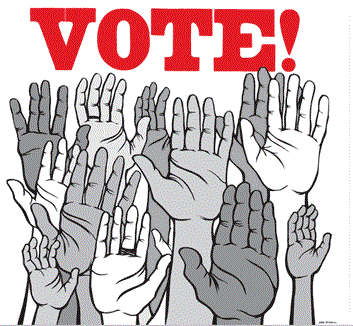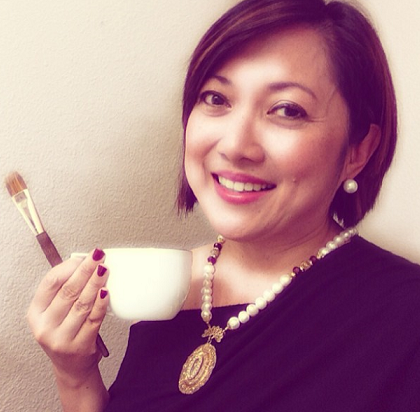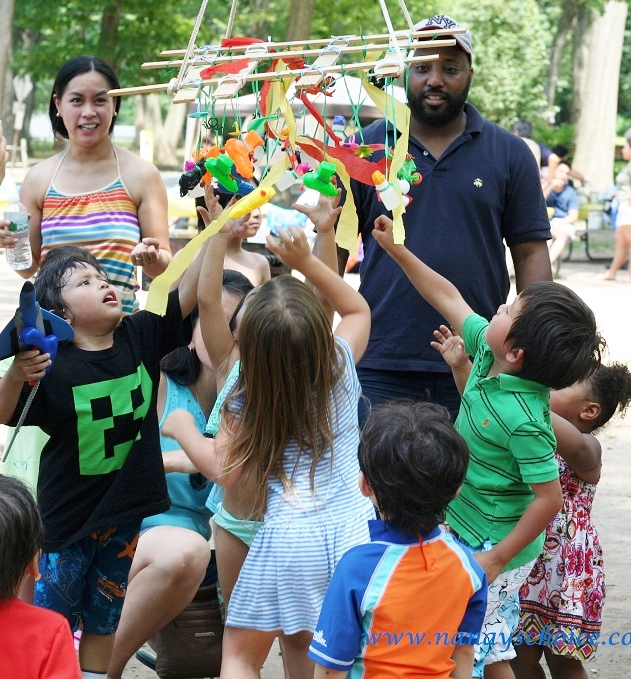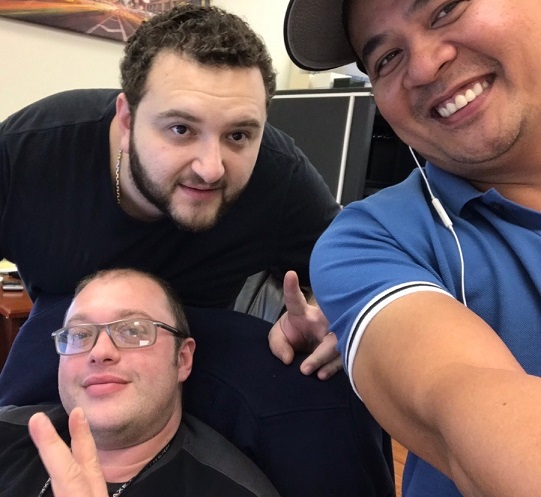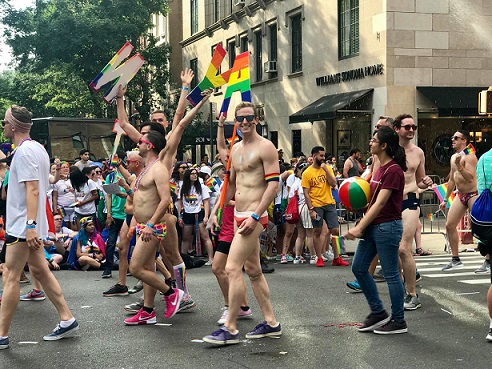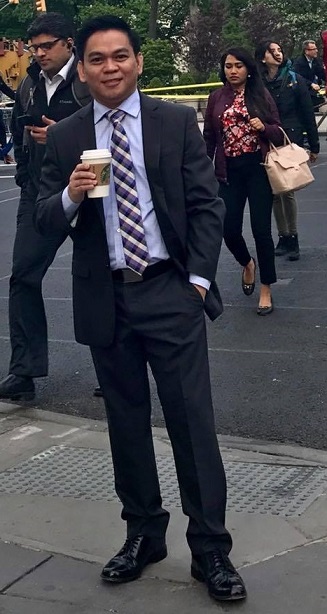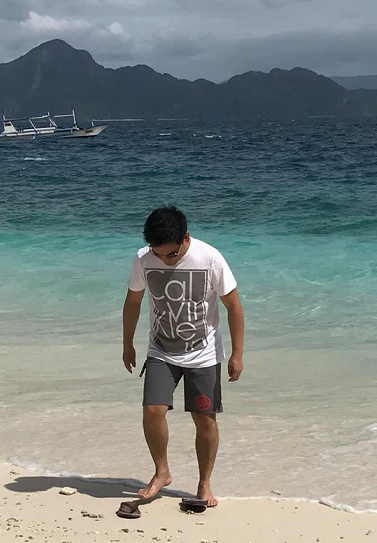Lawyer Nick Caraquel: How love and religion can sometimes win cases
By Cristina DC PastorEarly this year, he burst into the community in an intense, almost invasive way. An upstart lawyer who grew up dirt-poor in Davao selling banana cue to help his family. His story, shared more than 7,000 times, grabbed social media attention. He is now on radio, sharing immigration insights, dispensing advice. Last I heard, he will be marching at the Philippine Independence Day Parade on June 4 with his staff and some jubilant clients.
Who is this guy whose boldness appears to be ruffling some feathers ever since he opened his office on Queens Boulevard in February?
This week I finally met lawyer Nick Caraquel, 44, a smartly dressed, well-spoken man, polite, his face always radiating with a smile. While not imposing physically, he makes up for with some mighty declarations: He has never lost a case…He charges only $50 for consultations…He is a good lawyer.
People, taken by his rags-to-riches narrative, began following him on Facebook, some ditching their unresponsive immigration lawyers and asking him to pick up their cases. Right now, he shuffles more than a hundred clients mostly in New York and the Philippines. He makes sure he is on top of each and every case by using a program he designed where he is alerted when a case needs attention, for example, an appointment with the embassy, fees that need to be paid, or client that needs to be coached for an upcoming interview. All of them contained in a program module that sets off a trigger when he turns on his computer.
“Some lawyers, because of the number of cases they handle, they cannot manually check on the status of each of their clients,” he said. “I won’t say it’s deliberate, but sometimes it could just have been forgotten. Sometimes it’s been two years, and that is already considered technically abandoned.” Some clients may not be aware, he quickly added.
See, Nick was an engineer first before he became a lawyer. Possibly the first industrial engineer in his San Isidro barrio of Davao Oriental. So many firsts to his track record: the first in his barrio to graduate from Ateneo de Davao on scholarship, the first to become a lawyer, the first to go home in a brand-new car.
Nick is the sixth of seven children of Ladislao Sr, a barber, and Constancia, a former seamstress. While his parents are now comfortable and immensely proud of him, they are not the type who will brag about what he has accomplished professionally. His father continues to cut hair but now operates his own barbershop.
“We don’t want him to stop, baka magkasakit,” said Nick.
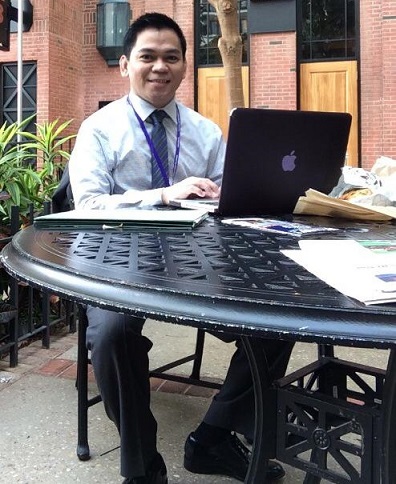
At the American Immigration Lawyers Association conference in Washington D.C., attending sessions and working on cases
Beginning in Jersey
He began as an immigration lawyer in Morris Plains, New Jersey. This was in 2012 after he passed the New York State bar. While some lawyers would charge $300 to $500 for a 10-minute phone consultation – the first thing they will ask is your credit card — Nick spoke with potential clients free of charge.
That changed in February when he moved to New York — where rent and parking fees are not cheap — because some of his clients were grousing about the commute to New Jersey. He is now charging $50 for, ideally, 30 minutes but let’s face it, some immigration concerns are not easy to dismiss after half an hour.
He remembers his first U.S. case. A Filipina caregiver from Long Island had been denied a visa two times. Pleading desperately for help and dangling legal fees of any amount, she sought his representation. He drove from New Jersey to Long Island to appear with her before USCIS. On the eve, as he was enjoying a hefty steak dinner, he realized the arduous challenge before him: Tomorrow, his client will either be approved, or be deported with her daughter if her visa is declined. He lost his appetite and pored over the case. His client was approved.
It became one positive outcome after another, but that did not make Nick a legal sensation right away. Donald Trump did. When the newly elected Trump made provocative statements on immigration – deportations, the travel bans, and a call to stop sanctuary cities – Nick offered to host a town hall in New York to address Filipinos’ concerns. People came to ask questions, learned about his banana cue backstory, and were captivated by his humble beginning.
Challenging cases
Am I a good lawyer because of my arguing skills or because I avoided the difficult cases, he would ask himself. He looks back at some of his challenging cases, the ones he had turned down. One involved a U.S. national with a record of molesting children looking to petition a Filipina fiancée with a child. Another case was that of an American man who did not want to let his Filipina fiancée know he was HIV-positive.
“I was brutally honest, I told them I will not accept your case, you will never win,” Nick said. “My mind and my heart will never be able to transcend the motion (I will be filing).”
One case was remarkably memorable because it had a happy ending. A client with a string of criminal convictions sought his help. He too did not want to let his Filipina girlfriend know about his past. Nick said he understood how it could be “very hard to talk about dark moments in one’s life,” but appealed to his client’s heart and reason. He then filed a criminal waiver asserting how this could help bring about healing and redemption to a couple looking to start anew. They are now happily married and living in Pennsylvania.
Sometimes, said Nick, “I use love and religion to argue a case.”
Copyright © 2017 The FilAm


